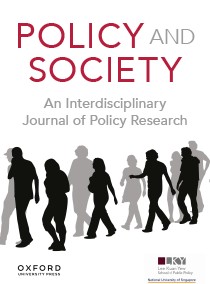量化世界中的全球公共政策:作为认知基础设施的可持续发展目标
IF 6.1
1区 社会学
Q1 POLITICAL SCIENCE
引用次数: 0
摘要
尽管行动者、危机和行动领域多种多样,但全球公共政策有一个不变之处,即在治理知识的生产中无处不在的指标。本文从理论上探讨了在2015年讨论并提出的17个可持续发展目标(sdg)背景下全球治理超量化现象。越来越多的指标,如用于监测目标和目标的指标和量化数据,不再仅仅是治理的工具,而是新型政治文化的象征,使物质、技术-政治和组织结构之间的相互作用成为可能,(统计)知识在其中产生、传播并转化为全球公共政策。本文提出了一种新的量化理论方法,作为一种“认知基础设施”,揭示了这种复杂性,这种基础设施跨越三个层面:物质性(如数据和指标)、相互联系(如网络和社区)和范式(如开展政策工作的新方法)。本文和本期特刊的其他文章从可持续发展目标的“认知基础设施”角度,分析了量化的知识实践(在广泛不同的政策领域、规模和地理区域)如何成为全球公共政策制定的核心。本文章由计算机程序翻译,如有差异,请以英文原文为准。
Global public policy in a quantified world: Sustainable Development Goals as epistemic infrastructures
Despite the multiplicity of actors, crises, and fields of action, global public policy has known one constant, that is, the ubiquity of indicators in the production of governing knowledge. This article theoretically engages with the phenomenon of hyper-quantification of global governance in the context of the 17 Sustainable Development Goals (SDGs), debated and introduced in 2015. Increasingly metrics—such as indicators and quantified data to monitor targets and goals—are no longer just tools of governance but rather are emblematic of the new types of political cultures, enabling an interplay of material, techno-political, and organizational structures within which (statistical) knowledge is produced, disseminated, and translated into global public policy. The paper unpacks this complexity by proposing a new theoretical approach to quantification as an “epistemic infrastructure,” which emerges across three levels: materialities (such as data and indicators), interlinkages (such as networks and communities), and paradigms (such as new ways of doing policy work). Using the lens of the “epistemic infrastructure” on the SDGs, this article and the others in this special issue analyze the ways that quantified knowledge practices—in widely varying policy arenas, scales, and geographic regions—are at the heart of the production of its global public policy.
求助全文
通过发布文献求助,成功后即可免费获取论文全文。
去求助
来源期刊

Policy and Society
Multiple-
CiteScore
18.00
自引率
6.50%
发文量
43
审稿时长
30 weeks
期刊介绍:
Policy and Society is a prominent international open-access journal publishing peer-reviewed research on critical issues in policy theory and practice across local, national, and international levels. The journal seeks to comprehend the origin, functioning, and implications of policies within broader political, social, and economic contexts. It publishes themed issues regularly and, starting in 2023, will also feature non-themed individual submissions.
 求助内容:
求助内容: 应助结果提醒方式:
应助结果提醒方式:


